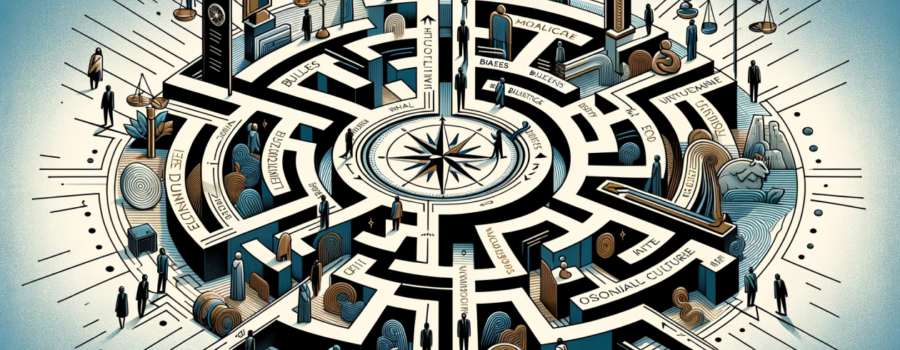Ethical Decision-Making: Beyond the Financial Sphere
Ethical dilemmas and decision-making challenges are not confined to the world of financial planning; they permeate all aspects of professional and personal life, affecting retirees, individuals, and professionals across various fields. Understanding the barriers to ethical decision-making can empower us to navigate these challenges with integrity and wisdom.
Blind Spots in Ethical Decision-Making
We all have blind spots that can lead to unethical behavior without us even realizing it. These include:
- Ill-Conceived Goals: Setting goals that inadvertently encourage negative behavior.
- Motivated Blindness: Overlooking unethical behavior when it’s in our interest to remain ignorant.
- Indirect Blindness: Holding others less accountable for unethical actions carried out by third parties.
- The Slippery Slope: Failing to recognize unethical behavior because it occurs gradually.
- Overvaluing Outcomes: Justifying unethical actions because the outcomes are beneficial.
Being aware of these blind spots can help us avoid falling into ethical traps.
Ethical Fading and Scripts
Ethical fading occurs when the ethical dimensions of a decision fade from our perception, especially when we focus on outcomes like client success or profit generation. This can lead to justifying actions like overcharging or overservicing without recognizing their unethical nature.
Ethical scripts, or our preconceived notions of how events typically unfold, can also influence our decisions, sometimes leading us away from ethical considerations.
The Role of Partisanship and Organizational Culture
Our relationships, whether as advisers, clients, or within a professional setting, often involve a level of partisanship where we align with specific interests or parties. While this can foster a sense of loyalty and commitment, it’s essential to ensure that it doesn’t compromise our ethical standards or the best interests of those we serve.
The culture within an organization significantly impacts ethical decision-making. A culture that emphasizes ethical behavior, transparency, and accountability can encourage individuals to act ethically. Conversely, a culture that prioritizes outcomes over ethics can lead to rationalizations that justify unethical behavior.
Navigating Unconscious Biases
Unconscious biases can subtly influence our decisions and behaviors. Recognizing and addressing these biases is crucial in ensuring our decisions are fair, equitable, and ethical.
Conclusion
Ethical decision-making is a complex process influenced by various factors, including our goals, biases, the cultures of our organizations, and our relationships. By being aware of these influences and actively working to mitigate their impact, we can make decisions that align with our ethical standards and contribute to a more just and equitable society.
Asterion’s Labyrinth: Navigating the Ethical Mazes Within (for the nerds!)
In the heart of the labyrinth designed by Daedalus, dwelt Asterion, known to many as the Minotaur. Unlike the monstrous image often portrayed, Asterion’s story is one of complexity and nuance, embodying the struggles between personal nature and imposed identity. His existence in the maze reflects the intricate journey of ethical decision-making, where the paths we navigate are fraught with biases, cultural pressures, and personal conflicts. The myth serves as a poignant reminder that confronting our ethical ‘Minotaurs’ requires understanding and compassion, acknowledging that beneath the surface of challenging decisions lie deeper truths and desires for resolution, much like Asterion’s own yearning for peace. It underscores the importance of empathy and introspection in our ethical quests, guiding us through the moral mazes we encounter. The myth also underscores the importance of steadfast values, akin to Theseus’s unwavering resolve, and the role of guidance, symbolized by Ariadne’s thread, in overcoming ethical dilemmas.
This article is intended for informational purposes only and does not constitute financial advice. Individuals should consult with financial advisors to tailor strategies to their specific circumstances.


